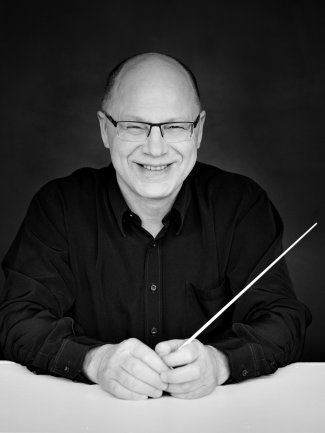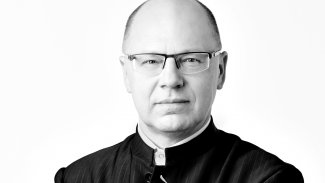



Arvo Volmer
Links
Download Assets
“Volmer was impassioned and tightly controlled. Every move, every gesture was designed to ensure the ultimate dramatic effect of each note, each syllable.”
(The Advertiser)
General Music Director: Estonian National Opera
Estonian conductor Arvo Volmer is widely acclaimed for his powerful performances in both opera and concert. Particularly well-known are his interpretations of Mahler and Sibelius, German, Nordic and Russian composers and contemporary music.
General Music Director of the Estonian National Opera, he leads new productions such as Donizetti’s Don Pasquale, Verdi’s Il trovatore, and the new Ravel:Ravel project featuring the composer’s one act work The Child and the Spells. Other current highlights include Volmer’s continued and intensive relationship with Orquestra Sinfônica do Estado de São Paulo and appearances with Orchestra Haydn di Bolzano e Trento, Orquestra Sinfónica do Porto Casa da Música, Oulu and Turky Symphony Orchestras and many more.
Volmer made his professional debut with the Estonian National Opera at the age of 22 and has been associated with the company ever since, becoming their Artistic Director and Chief Conductor in 2004. He became Associate Conductor of Estonian National Symphony Orchestra in 1989 and Music Director from 1993 until 2001. Volmer was Chief Conductor and Artistic Director of Finland’s Oulu Symphony Orchestra between 1994 and 2005.
Show more
In 2004 Arvo Volmer was named Music Director of Adelaide Symphony Orchestra – a position he held until the end of 2013. During this time, Volmer led the orchestra on tours to Los Angeles and New York’s Carnegie Hall and on projects such as the highly acclaimed, five-year long Mahler cycle. He continues his relationship with the orchestra into upcoming seasons.
Volmer has appeared at all the important theatres and opera houses and performed with orchestras such as BBC Philharmonic, City of Birmingham Symphony Orchestra, Singapore Symphony Orchestra, Taiwan Symphony Orchestra, Orchestre National de France, Orchestre Philharmonique de Radio France and all important orchestras in Australia. He has conducted Orchestra of the Komische Oper Berlin, Konzerthausorchester Berlin, NDR Radiophilharmonie, NDR Sinfonieorchester Hamburg – on tour in South America – and most of Scandinavia’s major ensembles including Finnish Radio Symphony, Helsinki Philharmonic, Gothenburg Symphony and Royal Stockholm Philharmonic Orchestra. As an opera conductor, Volmer has performed at the Bolshoi Theatre, Finnish National Opera, Den Norske Opera Oslo and regularly with Opera Australia in the Sydney and Melbourne opera houses.
Throughout his career, Arvo Volmer has made an extensive number of recordings, including the complete symphonies of Jean Sibelius for ABC (recorded following a cycle with Adelaide Symphony Orchestra) and the symphonic works of Eduard Tubin. He has also recorded the complete works of Leevi Madetoja and works by Swedish and Estonian contemporary music. His most recent release features the wind concertos of Ross Edwards with Melbourne Symphony Orchestra.
Arvo Volmer is a graduate of the renowned St. Petersburg Conservatoire’s conducting class, and in 1989 was a prize-winner of the Nikolai Malko Competition in Copenhagen.
Contacts
Sabine Frank Senior Director, Co-Head of Artist Management | Managing Director HP Munich | Head of International Offices
worldwide general management
“…and in this great work this impressive conductor came fully into his own. In terms of tempos, structural command and many myriad details – such as the manner by which he judged the elision into the 3/4 pulse in the first movement – together with his total grasp of every demand Sibelius asks of his interpreters, betokened a conductor of exceptional musicianship and technical mastery.”
“Conductor Arvo Volmer spiked its opening with viperous rhythms and clear-chiselled chords; its “big tune”, the missing link between Elgar and Eric Coates, was goose-pimple inducing. …”
“Bringing together all… diverse elements, each with their own special needs, was dedicated Mahler disciple, very artistic director and conductor Volmer. Always expressive, never a gesture wasted, conveying encouragement as well as approval to his hard-working soloists, he was modest in the many curtain calls, urging that the credit go to everyone but himself. But finally the glory was his.”









